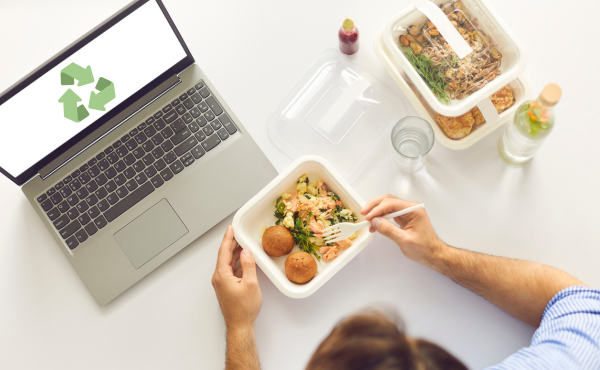
The to-go food industry has steadily grown over the last few years, and it’s likely not going to decrease any time soon. This is partially due to the coronavirus pandemic in 2020, where the restaurant industry had to find creative ways to stay afloat during lockdowns and quarantines. In many cases, this meant that no contact delivery, curbside pickup or just pickup in general was the primary source of business for them, and people got used to it. However, people are also growing more aware of what they consume, and the impact that it has on the environment and sustainability, and now states are beginning to ban the use of Styrofoam and plastic food containers, meaning restaurants are required to find alternatives and adapt.
Current State of the To-Go Food Industry
It’s important to understand the current state of the to-go food industry to better understand the impact that legislation regarding eco-friendly products can have on your restaurant and organization. According to lightspeedhq, “59% of restaurant orders from millennials are takeout or delivery”, and it’s projected that “delivery sales could rise an annual average of more than 20% to $365 billion worldwide by 2030”. It’s safe to say that to-go or delivery food options are going nowhere in the near future, and the use of related containers and packing will grow with it. However, with people being more conscious of their carbon footprint, new law and legislation is being put into place to limit the use of to-go containers that aren’t eco-friendly.
Which States Have Banned Plastic Bags and Styrofoam Containers?
There are currently 13 states that ban plastic bags, and 9 states that ban Styrofoam containers. However, as people become more and more aware of their carbon footprint, it’s likely that other states will join in banning these products and being prepared will ensure you’re in compliance with these changes. Using eco-friendly products is also a great unique value proposition, at least for now, and can give you an edge over your competitors that don’t use eco-friendly products.
States That Ban Plastic Bags:
- California
- Colorado – in January 2024
- Connecticut
- Delaware
- Hawaii
- Maine
- New Jersey
- New York
- Oregon
- Rhode Island – in January 2024
- Vermont
- Virginia
- Washington
States That Ban Styrofoam Containers:
- Colorado – in January 2024
- Maine
- Maryland
- New Jersey
- New York
- Vermont
- Virginia
- Washington
- Washington D.C.
Alternatives to Plastic Bags and Styrofoam Containers
There are many options available for renewable to-go containers that are durable, hot and cold friendly, and easy to use. For plastic bags, some great options would be to opt for paper bags rather than plastic, use reusable bags, or use cardboard boxes rather than bags altogether. For Styrofoam food containers, there are many different products available for different uses and in different sizes. There are to-go boxes, bowls, and cups that are made of eco-friendly materials, such as plant fiber or PLA plastic- plastic made out of sugar cane and other renewable materials.
Rhyme offers many different eco-friendly food containers, click here to shop now.
In Conclusion
Creating a sustainable, more eco-friendly organization is very achievable, and restaurants aren’t the only type of organization that can benefit from reducing the use of non-renewable products. Encourage the use of renewable products for your break rooms, ask employees to use reusable containers when bringing food in, and offer them recyclable containers and utensils for them to use in the breakroom. This is just one way of many you can meet sustainability requirements and shift to a more eco-friendly organization. If you’d like to learn more about our eco-friendly food containers or how you can bring sustainability into your workplace, click the button below.
Sources: WebstaurantStore | VerdictFoodService | lightspeedhq